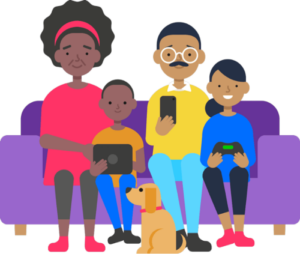Gender equality online can be a contentious issue. Our expert panel explores how you can discuss gender inequalities with your child and support their understanding of the issue in more detail.
Should parents make their children aware of the gender inequalities online? If so, how should they go about it?
When talking to our children about issues online, it can be difficult to know whether we feel like we have the knowledge, or indeed enough knowledge about a subject to explain it to them.
One of these subjects is Gender. The issue of equality in this area is highly sensitive and, at times, a contentious subject matter. As a child/adolescent and adult psychotherapist, this is a topic of many sessions. Young people are finding their identity as they develop and mature, and this includes reading and watching content online that can inform them about who they are becoming.
The parents and guardians who come to my office are sometimes confused, sceptical or have in-depth knowledge on this issue. They want me to advise on how best to let friends and family know about their/other children and the space of gender inequalities, support and oppression online. The best advice for these guardians is to have open conversations about the fact that human beings and how they see themselves can be complicated. As such, the spaces online can be both hostile and supportive of young people who are identifying (or not) with a specific gender and the language surrounding that.
Open dialogue is important with young people and, of course, in order to have open dialogue, adults must have an open mind and personality with a desire to learn more without judgement. Our role as the adults is to help our children navigate the online space and sometimes we need to be the role model of this very behaviour.
How can parents promote gender equality online with their child?
It always leads to a very interesting discussion to ask young people to consider the differences in terms of the way they communicate with boys and girls in online spaces. The conversations that follow are often funny but always revealing as children and young people describe their choices with regards to language, subject matter, tone and use of kisses and emojis.
This can be a useful entry-point into wider about the broader issues related to how males and females are treated online in wider contexts, such as whilst gaming, in terms of representations of bodies and the way in which boys, girls, men and women are presented in advertising, campaigns and in online news and media articles.
This is a really useful exercise in bringing to their awareness the gendered nature of so many aspects of the internet which can be revisited as the child grows up and their interests and online activities move on.
How can parents promote gender equality online with their child?
Every parent wants the best for their child. In the modern world, this means helping them overcome unfair and unreasonable obstacles which otherwise would hold them back or maybe even cause real distress. Nowhere is this more apparent than in relation to gender inequalities.
In images and games, too many parts of modern culture still send out a message that women and girls should be pretty, have perfect figures, worry about their appearance and behave in certain ways in order to get and keep a boyfriend. Boys have to be musclebound and tough, ready to fight and win prizes in very physical sports. And if you are from an ethnic or other minority, you might not see yourself at all.
Thankfully, today there are tons of resources available which can help parents start a conversation about the importance of recognising everyone as a valued individual in their own right and how important it is to accept differences, not judging people as better or worse just because they don’t seem to conform to comic book images or because they are from a different religious or cultural background.
Recommended resources:
- The Online Together Project
- How to talk to your child about gender equality
- Gender equality teaching resources
- Parents can promote gender equality and help prevent violence against women. Here’s how
How can parents accurately teach and support their child’s understanding of gender inequality in online gaming and social media communities?
First and foremost, parents must teach their children about gender inequality in society as a whole. They must make sure that their children know what obstacles face marginalised genders in general so that they already have a good foundation before entering the online world.
Aside from that, it is important to keep open channels of communication, even if it can be frustrating. This will guarantee that a child will ask a parent when they are unsure of something they have encountered, as opposed to looking online for the answer, which can have dangerous consequences.
Parents do need to teach their children about online dangers and the risks of assuming that what they encounter online, particularly in role-playing games, is actually representative of real life. For example, engaging in violence or misogyny are very much unacceptable and there should be a constant process of self-evaluation as to whether the young person is subconsciously adopting any of these behaviours.
Finally, whilst children should be encouraged to discover the world for themselves, they should be warned against automatically trusting strangers online and taught about potentially dangerous groups who may seek to manipulate them to adopt sexist views. An example particularly relevant here is incels.









